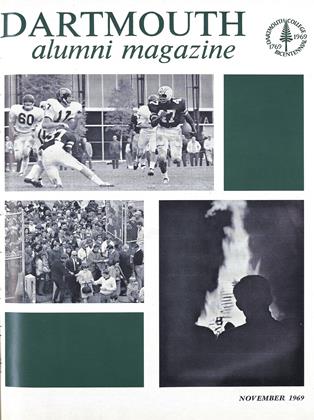The doors of the medical profession open slowly to its initiates, since they require the keys of pre-medical scholarship, a quadrennium of specialized study, and the tedium of internship. In the case of JOHN P. MERRILL '38. there was also a five-year tour of medical duty in the Air Corps. All of this brought him into Boston's Peter Bent Brigham Hospital at the ripe age of thirty.
With his residency complete, he chose as his specialty the study of heart disease, and was shortly made an Established Investigator for the American Heart Association. He found the heart so vitally linked to the kidneys that any malfunction of the latter had an adverse effect on the heart; the kidneys must keep the human body rid of wastes and poisons, and build up and constantly purify the blood stream. Modern Medicine reported in 1964 that "curiosity and serendipity put Dr. Merrill on the road to his chief interest renal disease, and its treatment with the artificial kidney and kidney homo-trans-plantation."
Taking the basic design of an artificial kidney in use in Holland, Dr. Merrill, in collaboration with Dr. Carl Walter, devised a 400-pound machine, and put it into operation. It drew blood from the patient's arm artery, pumped it through 43 yards of plastic tubing, and purified the blood of the entire body every 35 minutes, ridding it of all wastes and poisons twice as fast as the human body can do it on its own.
During its pilot years the device was used in 265 special cases. Now it is used routinely for post-operative shock, the revival of persons suffering from overdoses of bromides, for improving patient condition before operations, and at times for the treatment of nothing more serious than gout.
Although mainly used as a temporary measure prior to a kidney transplant, it often becomes a permanent fixture of the body, and there are many instances where patients are discharged to their homes, with the artificial kidney still in operation.
A present concern of Dr. Merrill is "Immunology," and he states, "I am hopeful of finding a systematic method of matching organ donors with recipients so closely that no drastic steps need be taken to overcome the phenomenon of foreign tissue rejection. We are starting to sort tissue by type, and will have tissue banks similar in nature to the blood banks that have been so successful."
As Director of Cardio-renal Services at Peter Bent Brigham he works with a transplant team of over fifty professionals, technicians, and nurses, and acts as "the conductor of the orchestration." He is currently President of the International Society of Nephrology. However, he feels that his selection as President of the American Society of Clinical Investigation in 1963 was "my finest honor, which I cherish as much as a Nobel Prize."
Today transplantation has become a world-wide experience, with over 3500 successful operations to date. An International Transplantational Society has been organized which regularly exchanges ideas and procedures.
Dr. Merrill's investigative work and hospital duties are supplemented by a fairly heavy load of teaching. Peter Bent Brigham is a teaching arm of the Harvard Medical School, from which he got his medical degree in 1942, and as Associate Clinical Professor of Medicine he works mainly with third-year students. As a teacher he firmly believes in the value of combining research with clinical medicine.
Dr. Merrill purposefully takes time away from his professional duties since he feels that "it is critically important for a physician to have outside interests, so that he can come back to medicine refreshed." Accordingly, he is an amateur actor and playwright, a clarinetist in a Dixieland combo, a sailing enthusiast, a competitive tennis player, and a breeder of golden retrievers. His home is a 75-year-old farmhouse in the Boston suburbs, and summers are spent on Squirrel Island, out of Boothbay Harbor, where his family has estivated for 65 years.
His wife says, "John is basically an aesthete. He likes nothing better than to take a copy of Keats and go off and read by the brook."
 View Full Issue
View Full Issue
More From This Issue
-
 Feature
FeatureBlack Studies: A Beginning
November 1969 By SUSAN LIDDICOAT -
 Feature
FeatureThe Most Dangerous Gap of All
November 1969 By THOMAS J. McINTYRE '37 -
 Feature
FeatureThe Dean Charts a Course
November 1969 -
 Feature
FeatureA Conclave of Noted Scientists
November 1969 -
 Feature
FeatureCOED EXCHANGE
November 1969 -
 Article
ArticleWith the Big Green Teams
November 1969
HAROLD BRAMAN '21
-
 Article
ArticleFor Whom the Bell Tolled
February 1962 By HAROLD BRAMAN '21 -
 Feature
FeatureHORNING: Invention of the Devil
DECEMBER 1963 By HAROLD BRAMAN '21 -
 Article
ArticleAle Man
JANUARY 1969 By HAROLD BRAMAN '21 -
 Article
ArticleLens Artist
FEBRUARY 1969 By HAROLD BRAMAN '21 -
 Article
ArticleDeep Sea Explorer
JUNE 1969 By HAROLD BRAMAN '21 -
 Feature
FeatureMovie Producer
DECEMBER 1969 By HAROLD BRAMAN '21







